- The mechanism of nerve hair loss
- Determining the cause - stress
- Diagnostics
- Types and mechanism of stress
- Chronic irritants
- Sudden stressful exposure
- How to stop hair loss after stress
- Treatment for hair loss after stress
- Tips for Removing Stress from Life
- How to deal with stress loss
- Effective remedies
- Cosmetics and restoration services
- Cosmetics
- Cosmetic procedures
- Conclusion
The mechanism of nerve hair loss
Hair is a litmus test by which we can determine our emotional state. Let's look at the essence of this relationship.
Consider two possible scenarios for the development of events:
- 1. A short but very intense effect of a stress factor. It can be an unexpected dismissal, the loss of a loved one, an experienced car accident or an attack at the entrance - in a word, any event that fell like snow on your head and was very unsettled. What can happen to hair in a similar situation?
We all have repeatedly observed how cats or dogs put their fur on end, sensing the approach of danger. This is one of the ways of self-defense that nature has provided for animals: thus they seem larger and scarier.
Oddly enough, but we have preserved this atavism. True, not in such a pronounced form. The hair shaft is lifted by the contraction of a muscle that attaches to the skin and hair follicle.
Under stress, the muscle contracts sharply, and then contracts just as sharply, which leads to squeezing of the hair follicle. As a result, the hair root can be severely damaged. Hair loss can sometimes occur dramatically under stress. But even if the rod did not fall out, due to the squeezing of the follicle, its full growth is no longer possible.
As a result, the follicle continues to function half-heartedly, producing thin and ugly rods.

- 2. The planned action of stress factors. Constant hassle at work, traffic jams, tensions in the family ... Each of us has a lot of worries. But if nervous tension builds up, changes occur at the physiological level. Digestion is impaired.
The body does not receive enough nutrients - and even if your menu is completely balanced, it simply is not able to fully use all the calories, minerals and vitamins. Blood circulation is also impaired.
Consequently, the organs, including the scalp, are not adequately supplied with oxygen and nutrients. Hair becomes thin, weak. Hair loss after stress can occur even with minor exertion. And finally, against the background of nervous shocks, malfunctions of the endocrine system begin. Decreases the production of estrogens - female sex hormones that activate hair follicles.
An imbalance between estrogens and androgens occurs and the hair loss process progresses.
The saddest development of events is trichotillomania. A person suffering from trichotillomania literally tears his hair out - on the head, eyebrows, etc. If the situation has reached this pathological stage, it will not be possible to cope with it without qualified psychological or neurological assistance.

Separately, it should be said about how stress affects hair loss in women. A few years ago, scientists in Britain conducted a study that found out that every second woman who complained about a problem of hair loss experiences chronic lack of sleep.
Another study in this area has shown that working women are more likely to experience hair loss.
Moreover, the acuteness of the problem was directly dependent on the level of responsibility of the position of the researched. Women are inherently more emotional, so they react more strongly to stress. At the same time, the beauty of hair is one of the most important factors in attractiveness and femininity.
Therefore, the loss of curls is especially painful for the fair sex, thus falling into a vicious circle: hair falls out due to stress, their loss causes even more stress, and the problem is only aggravated.
Determining the cause - stress
Even at home, it is easy to independently check the intensity of the loss. To do this, just run your hand over the strands. If there are more than 5 units left in the hands, then the hair needs to be reanimated. In the absence of timely treatment, irreversible consequences can occur in the body.
If the follicles have weakened due to nervous tension, the following symptoms are observed:
- trunks become dry, thin, hard;
- pigmentation changes;
- cross-section and porosity not only in sections, but also along the entire length;
- curls are difficult to comb, tend to form knots;
- thinning of individual sections;
- dryness, irritation of the scalp, dandruff, seborrhea appear.
Important! When the first signs appear, you should contact a trichologist. Perhaps, in the complex of treatment, a consultation with a neurologist and medication will be required. The trichologist conducts a survey of the patient, tests the condition of the hairline at the current moment.

Diagnostics
To establish the exact cause of hair loss, you will need the following ways:
- Computer micro-video diagnostics.
- Spectral analysis of hair - an assessment of the level of minerals.
- Blood test.
It is computer micro-video diagnostics that allows you to accurately determine whether stress is the cause of loss. With prolonged emotional stress, narrowing of the hair shaft is observed. A large area of constriction indicates a long-term emotional imbalance.
Types and mechanism of stress
Throughout life, positive and negative emotions paint the world with rich colors. Different types of stressful conditions trigger complex processes in the body.
Chronic irritants
Neuroses, anxiety, depression, apathy - lead to a gradual suppression of hair follicles. External manifestations of agitation and emotional stress trigger chemical reactions.
How stress affects hair:
- Dominance in nervous activity of excitement, leads to the release of adrenaline. Malfunctions of the endocrine system provoke hormonal imbalances. In the first stages, it is reflected in the condition of the hair.
- In the future, changes become the cause of oxygen starvation, a deficiency of nutrients in the blood. Hair follicles do not receive vital elements. Hair growth stops.
- With a prolonged absence of oxygen, vitamins, minerals, the cells that form the bulb are destroyed. As a result, the formation of new rods does not occur, and the old ones fall out.
Sudden stressful exposure
With sharp emotional stress, the influence of adrenaline leads to changes in the structure. When the muscle fibers contract, the bulb is squeezed and lifted. Mechanical damage provokes the destruction of the rods. Partial or complete hair loss is observed.

How to stop hair loss after stress
- There is no magic pill that immediately relieves the effects of stress. However, for all patients experiencing hair loss due to stress, experts advise the following:• If possible, eliminate stressors. Of course, it is not always possible to throw a letter of resignation in the face of a boss or run away from family problems in Bali. However, minimal measures to reduce nervous tension can be taken. Take time off from work or relationship time.Sign up for a yoga school or swimming pool. Try aromatherapy. Maybe it makes sense to go to a psychologist. Find a personalized way to heal yourself.
• Lead a healthy lifestyle. Hair loss due to stress is often aggravated by bad habits - "sticking", "smoking" or "drinking" the problem. Of course, eating a huge cake or drinking a couple of glasses of wine in the evening is much faster and easier than forcing yourself to go for a run in the park or at least arrange for yourself a relaxing warm salt bath. But by doing so we are only methodically harming ourselves.
• Get enough sleep. Nervous stress often goes hand in hand with insomnia. Do not drink coffee or tea at night. Don't watch TV. Sleep only in a well-ventilated area and in complete darkness. Review your work schedule. Sleep quality directly affects the quality of our life. If you cannot get rid of insomnia on your own, it makes sense to consult a doctor - he will prescribe sedatives that will help to establish a sleep pattern.
• Drink vitamins. Let your doctor prescribe a balanced multivitamin complex that includes vitamins A, B, E, C, D, as well as iron, potassium, zinc, iodine, magnesium and other trace elements. Some cosmetic brands produce specialized mineral and vitamin complexes for hair strengthening.
• To quickly overcome the effects of severe hair loss after stress, carefully monitor your diet. Any fasting diets and veganism are prohibited. You need to support your body. Moreover, on a subconscious level, we perceive the need for any restrictions as stress.
• While hair is recovering, exclude any traumatic aesthetic procedures - coloring, permanent styling, etc. Minimize styling and blow-drying. Do not use metal combs. They irritate the scalp, electrify and confuse hair. Give preference to combs made of plastic and wood.
• Find a masseur. Usually, with severe stress, clamps occur in the cervical spine. This leads to poor circulation in the scalp. Massage will remove them. In addition, this procedure is generally relaxing. By the way, if possible, do a head massage as well.
• Do not neglect folk remedies for restoring curls. What to do in case of stress-related hair loss? Homemade masks, which have a local irritating effect and thereby stimulate blood circulation in the scalp, will help.
Here are some effective homemade recipes:
- Onion. Grate the onion on a fine grater, squeeze out the juice and rub the juice into the scalp. If you have very delicate skin, mix 1 to 1 onion juice with natural yogurt.
- Mustard. Dilute the mustard powder with warm water until a mushy consistency is obtained. Apply to hair and scalp.
- Grapefruit. Mix 1 cl. a spoonful of burdock or castor oil with 1 teaspoon of honey and the juice of half a grapefruit.
The principle of using all home masks is the same:
- Masks must be fresh, that is, they must be applied immediately after preparation.
- After applying the mask, wrap your head in plastic, or put on a special shower cap and warm it with a terry towel.
- To achieve the effect, the mask must be held for at least half an hour. But if the scalp burns badly, wash off the composition immediately.• Choose the right makeup. Products of the mass market segment in your case will be useless. Almost every premium brand offers a line of hair loss treatments. They contain vitamins, antioxidants, collagen and other active ingredients that provide your hair with nutritious nutrition.
And remember: than thinking about how to restore, hair loss from stress is easier to anticipate. Take care of your hair every day, do not neglect your health and learn to treat life philosophically - there is not enough hair for all problems!

Treatment for hair loss after stress
The very first step is getting out of the stressful situation. You need to move from nervousness to calmness and immediately begin treatment.
- Conduct an examination of the body. It is necessary to exclude the presence of internal violations and failures. Otherwise, it will be necessary to prescribe drugs to normalize the hormonal background. To do this, you need to visit a trichologist, who will prescribe an appropriate examination or refer you to a highly specialized doctor.
- Sedatives. Mild sedatives can help cope with bouts of depression, relax muscles, and improve sleep and overall well-being. Before using medications, you should consult with a specialist. From light herbal remedies, valerian root, motherwort tincture, is usually prescribed.
- Take a comprehensive approach to the problem. Only internal or external influence is not enough. Combine vitamin intake with cosmetic products.
- Take a relaxing massage course. Chronic nervousness is usually accompanied by cramping in the back and neck, which, in turn, can make it difficult for the blood supply to the hair roots. Therefore, it will not be superfluous to massage the neck-collar zone and head, and if funds allow - the whole body. After such a course, you will definitely feel better, hair nutrition will improve, stress will recede.
- Say no to hot styling. Weakened hair is already fighting for life with the last of its strength, you should not aggravate their torment. Therefore, if possible, do not use a hairdryer and styling tongs; it is also better to put off hot curlers for a while.
- Introduce anti-stress rituals. To combat depressive moods, everyone has their own methods of treatment: a relaxing bath, an interesting book, sports, shopping, meeting with friends - find your own and practice more often.
- Use folk remedies. When you've eliminated stressors from your life, folk remedies are a good addition to your hair treatment. Do homemade masks and wraps to nourish the roots, massage your scalp, and limit the use of styling appliances to avoid stressing your hair.
- Take vitamins for hair restoration: it can be vegetables and fruits rich in vitamins A, B, D, E or special preparations.
- Use quality care products. Control the amount of hair loss, use special shampoos and masks to strengthen and intensively nourish weakened hair.

Tips for Removing Stress from Life
- Take a walk in the fresh air. Try to spend at least a couple of hours on the street every day - this activates brain activity and has a beneficial effect on the state of the nervous system.
- Sleep at least 8 hours. This is what doctors advise, but this figure is very averaged - someone lacks 9, and someone gets enough sleep in 7 hours. Therefore, you need to go to bed at the same time every day and wake up without an alarm clock - after a week of such experiments, you can determine how much your body needs to sleep.
- Give up dieting: any restriction is already stress. Eat clean foods that contain vitamins and minerals. Think of weight management restrictions as an escape from food waste, not as a forced deprivation. Thus, your body will get used to the new type of food and will not accept the diet with hostility.
- Meet friends or spend time at your favorite museum / cinema. It is better to experience any stressful situations not alone, so as not to withdraw into yourself. In addition, communication with loved ones and a pleasant pastime develop creativity, make you look at the world and at your own emotional state differently.
- Go in for sports. Light physical activity up to 30 minutes a day reduces nervous tension by 30%. If you cannot find the strength to join the sport on your own - sign up for a gym for group classes or dancing - training in a team is much more interesting and productive.
- Create a relaxing environment for yourself. Aromatherapy has a relaxing effect on the entire body, just as changing the color of the wallpaper sometimes saves you from blues. Leave time to be alone with your own thoughts and feel the true desires of your body.

How to deal with stress loss
Hair treatment starts with optimal care products. Shampoo, conditioner, strengthening spray should be chosen from natural lines. Study the composition carefully for parabens, preservatives.
It is recommended to give up styling products and tools - hair dryer, ironing, mousse, varnish. To restore hair nutrition, it is worth protecting the curls from any physical and mechanical influences. Overhead wefts, high tails, dyeing, curling - weaken the root system.
How to stop loss due to nervous tension:
- It is recommended to drink a course of multivitamins, including vitamins of group B, A, E, C, D, minerals - iron, magnesium, calcium, zinc, phosphorus, iodine, selenium.
- Observe the principles of rational nutrition: fresh vegetables, fruits, fish, dairy products must be present.
- A course of head massage improves blood flow, accelerates the supply of nutrients to the bulbs.
- Homemade firming masks are rich in acids, active substances. Based on the use of burdock oil, nettle, sandalwood, bergamot, honey, brewer's yeast.
- Mesotherapy for hair, injections of drugs, medicinal cocktails is effective: they activate metabolic processes in the bulbs, improve microcirculation.
- To restore emotional balance, you can take relaxing baths, carry out aromatherapy, master breathing exercises, yoga.
The main guarantee of beautiful strong hair is positive emotions. To increase stress resistance, it is necessary to play sports. Walking in the fresh air, full, high-quality sleep will help restore the natural radiance, shine of curls. Caring procedures are of great importance. Regular hair care will help to cope with the problem of hair loss.
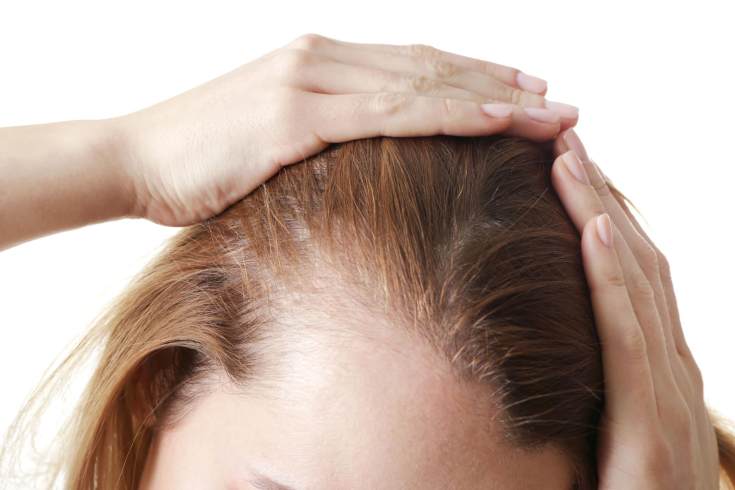
Effective remedies
Girls often wonder how to restore hair after stress as quickly and preferably as cheaply as possible.
Strengthening procedures will help to stop the process of hair loss:
- vacuum treatment;
- head massage;
- oils of natural origin (olive, castor, coconut, burdock);
- masks with natural tar.
You can use drugs that stimulate growth. But they are not suitable for everyone. May cause an allergic reaction, so a test should be done first.
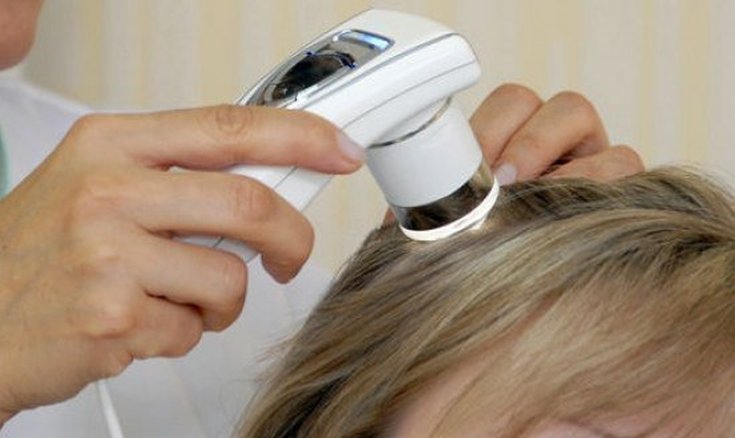
Cosmetics and restoration services
Not every woman knows how to treat hair after neurosis on her own.
Cosmetics
Choose beauty products from trusted brands. Products must be certified to have a minimum of side effects. The composition should include:
Choose beauty products from trusted brands. Products must be certified to have a minimum of side effects. The composition should include:
- vitamins B5;
- grain proteins;
- liquid keratin;
- antioxidants;
- amino acids;
- ceramides, etc.
If your hair falls out from stress, consult a trichologist. He will advise on effective balms, masks, conditioners, nourishing oil blends. The optimal solution is capsules with fortified liquids. They are rubbed into the scalp before washing and washed off after an hour. The average course of treatment is up to 3 months.
Massage serum into your hair to speed up the recovery process. A prerequisite is that it must not be washed off. Its purpose is to make curls smooth and soft, to protect from external factors.
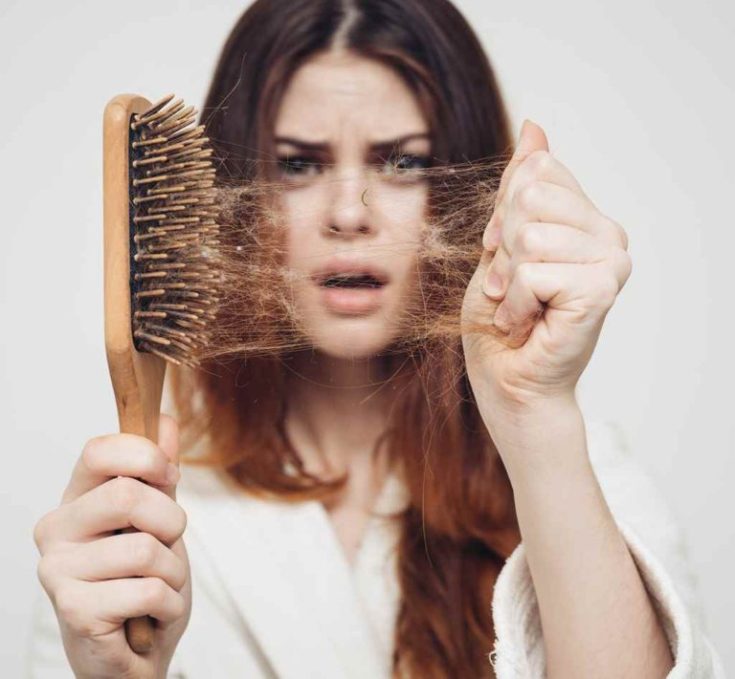
Cosmetic procedures
Special procedures will help to enhance the effect of drugs. They are made in beauty salons using special equipment. The most popular is mesotherapy. These are injections of the necessary medications into the scalp. Nutrients quickly enter the follicles and activate their work.
But if the patient already has a receding hairline, mesotherapy is pointless.
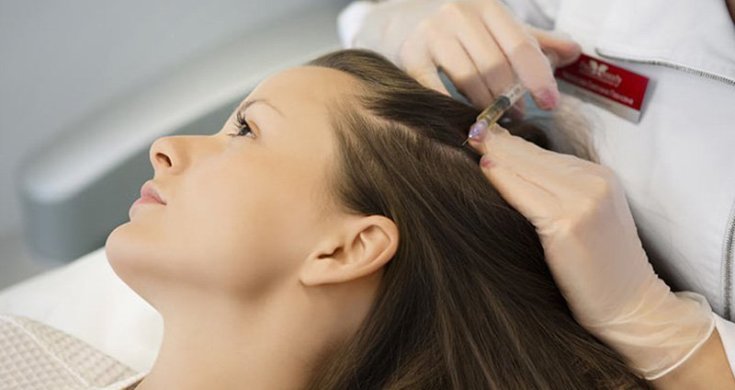
Other procedures:
- Darsonvalization - electronic impulses activate nerve endings, small vessels, skin glands. Short-term cramps have a positive effect on the scalp. It is important to do the procedure regularly, otherwise the desired results will not be achieved.
- Ozone therapywhen the curls are enriched with ozone. Can be injected or wrapped. Brings results at the initial stage of hair loss. Less effective than mesotherapy, but it will help to restore the former head of hair.
- Phototherapy - UV rays from artificial sources are directed to the hair and scalp. The length of the light wave and the exposure time are determined by the beautician.
- A similar method is laser therapy. Lasers 6-8 mm long penetrate the surface of the head and increase blood circulation. Hair restoration after stress by this method is possible in the presence of living follicles.
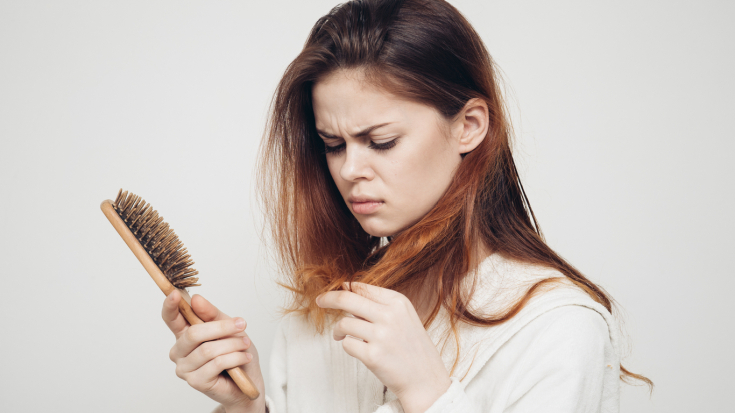
Conclusion
Every woman knows how stress affects the body. Alopecia is common after severe emotional shock. Having dealt with the causes of the loss and the individual characteristics of the patient, the doctor prescribes treatment. Duration - 3-6 months.
Balms, serums, hair masks will help restore the former beauty of the hair.
You can use cosmetic services: laser, phyto- and ozone therapy, darsonvalization. Folk remedies help well. Please be patient, try different methods and you will succeed!
